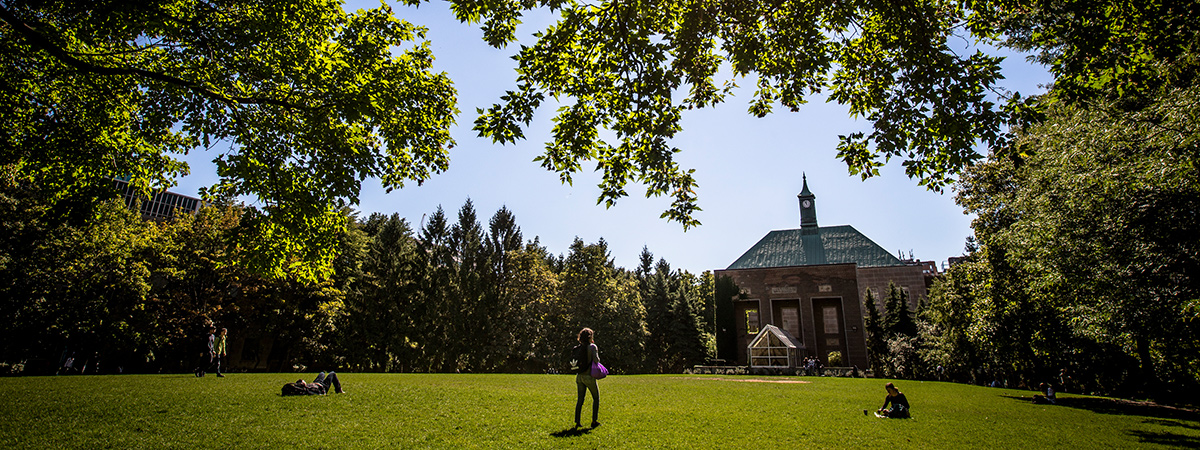Tri-Council Funding

The prestigious Canada Research Chair (CRC) program, an initiative of the Government of Canada’s Tri-Agencies, provides upcoming and established faculty with the opportunity to advance world-class research while also training student researchers to become the next generation of highly qualified personnel. During the 2019-20 fiscal year, Ryerson saw Miranda Kirby named a new CRC and the renewal of second-term CRCs for Roberto Botelho and Julia Spaniol.
Roberto Botelho (Chemistry and Biology), the CRC in Organelle Function and Adaptation, will continue his research focusing on specialized structures within cells called lysosomes, a better understanding of which could help researchers develop medicines that boost human immunity.
Miranda Kirby (Physics) was announced as the new CRC in Quantitative Imaging and is developing automated ways of extracting information from CT and MRI images to help assess smoking-related lung diseases.
Julia Spaniol (Psychology), the CRC in Cognitive Aging, will be using her CRC renewal to further her research into the impacts of motivation on maintaining and improving brain and cognitive functions across the adult lifespan.

The NSERC-IRC program empowers strategic, five-year collaborations between university faculty and the public/private sector, combining each entity’s existing strengths towards addressing research challenges — and developing new solutions — that have the potential to benefit the country and Canadians.
Frank Russo (Psychology), the NSERC/Sonova Senior Industrial Research Chair in Auditory Cognitive Neuroscience, will lead a study in collaboration with Sonova, the world’s leading manufacturer of hearing aids. The multifaceted project will be the largest-ever brain-imaging study to investigate listening effort among hearing aid users.
Fenfeng (Jeff) Xi (Aerospace Engineering), the NSERC/Bombardier Senior Industrial Research Chair in Advanced Interiors and Systems, in partnership with Canadian aircraft manufacturer Bombardier, will embark on the development of a cabin design prototype that is reconfigurable based on customer demands and that includes state-of the-art features for monitoring and controlling passenger well-being.

The Tri-Council agencies support and enable Ryerson's SRC activities across a broad range of disciplines. In the 2019-20 fiscal year, the Tri-Council agencies awarded Ryerson researchers with approximately $20.3 million in funding. The university saw two firsts during this time: the awarding of a Canadian Institutes of Health Research (CIHR) Foundation Grant and the awarding of several Natural Sciences and Engineering Research Council of Canada (NSERC) Alliance Grants — the latter supporting collaborations between university researchers and partners from the private, public and not-for-profit sectors.
$20.3M Total Tri-Council funding
$10.5M Natural Sciences and Engineering Research Council of Canada (NSERC) funding
$2.7M Canadian Institutes of Health Research (CIHR) funding
$7.1M Social Sciences and Humanities Research Council of Canada (SSHRC) funding

In March 2020, the Government of Canada launched rapid research funding competitions to address the medical and societal challenges arising from the COVID-19 outbreak, with funding provided through the Canadian Institutes of Health Research (CIHR), the Natural Sciences and Engineering Research Council of Canada (NSERC), the Social Sciences and Humanities Research Council (SSHRC), the Canada Research Coordinating Committee (CRCC) through the New Frontiers in Research Fund (NFRF), the International Development Research Centre (IDRC) and Genome Canada (GC).
These are just some of the Ryerson researchers who were among the first of a national cohort to receive this rapid research funding support:
Anatoliy Gruzd (Information Technology Management) is collaborating with Royal Roads University to examine how COVID-19-related misinformation propagates across social media platforms and will be developing a real-time information dashboard that will help the public track efforts to debunk misinformation online.
Patrick Neumann (Mechanical and Industrial Engineering) and Nancy Purdy (Nursing) are co-leading a multidisciplinary team to refine infection control routines for health-care professionals, as well as develop a computer simulation that helps to manage staff and nursing workloads during varying severities of COVID-19 outbreaks.
Lu Wang (Geography and Environmental Studies) will undertake a health geography approach to analyzing the movement patterns of individuals, the preventative measures they take and how these patterns affect COVID-19 transmission in order to identify public health responses for neighbourhoods that need greater resources.

Candice Monson (Psychology), in a Ryerson first, received a CIHR Foundation Grant, which enables seasoned researchers to pursue new lines of inquiry. She will use this prestigious grant to support further expansion of her research to help individuals with post-traumatic stress disorder (PTSD), and to develop and test the use of interventions like e-health.
Michael Olson (Chemistry and Biology) was awarded two grants from the CIHR Project Grant program. One grant will support his investigation into how MICAL1, an enzyme that naturally occurs in the body, contributes to cancer growth; the second grant will support his research into the role of the protein ROCK1 in the development of cancer.
Josephine Wong (Nursing) received CIHR Project Grant support to study and develop capacity building strategies for racialized and other under-represented communities in Alberta and Ontario to reduce HIV stigma and promote community resilience. Such stigma impedes HIV prevention and access to care, producing health disparities among marginalized groups.

Ling Guan (Electrical, Computer, and Biomedical Engineering) received support from NSERC’s new Alliance Grants program to develop interpretable machine learning algorithms for computer-aided diagnosis of neonatal lung and heart diseases for use in neonatal intensive care units. He will work with industrial partner Dapasoft Inc.
Jennifer McArthur (Architectural Science) received support from NSERC’s new Alliance Grants program and will work with industrial partner FuseForward to develop a digital twin of the Ryerson campus. This will provide interactive real-time data viewing and scenario simulation in order to explore smart-building technologies and processes to support optimization and detect and flag unusual events.

Wendy Cukier (Business Management) received support from SSHRC’s Partnership program to examine the barriers that women and diverse groups face within Canada’s innovation and entrepreneurship ecosystem. Called the Inclusive Innovation and Entrepreneurship Network (IIE-Net), the partnership will explore strategies that tackle these issues and strengthen this ecosystem, and will engage more than 1,000 stakeholder organizations and 100,000 entrepreneurs.
Sepali Guruge (Nursing) received a grant from SSHRC’s Partnership program to lead a cross-disciplinary team that will conduct research into the development of interventions to help reduce social isolation and promote social connectedness among older immigrants in Canada. The project will take place in nine cities across Canada and support more than 150 students and junior faculty.